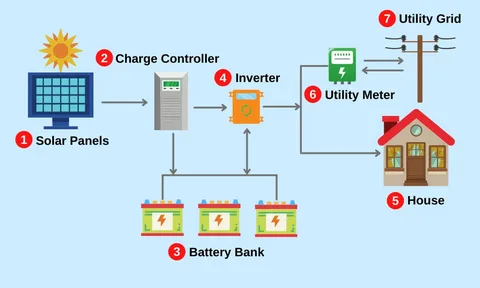In today’s world, many people are exploring sustainable and independent lifestyles. One popular choice is off-grid living, which means disconnecting from traditional utility grids and generating your own power. A key technology that enables this lifestyle is the solar battery. This article will explore off-grid living: how a solar battery makes it possible, highlighting the benefits, technology, and practical considerations.
What is Off-Grid Living?
Off-grid living refers to a self-sufficient lifestyle where a household or community operates independently from public utility services such as electricity, water, and sewage. People who choose off-grid living typically rely on renewable energy sources, rainwater collection, and other eco-friendly solutions to meet their needs. This lifestyle offers freedom, environmental benefits, and sometimes cost savings.
The Role of Solar Power in Off-Grid Living
Solar power is the most popular renewable energy source for off-grid living. Solar panels convert sunlight into electricity, which can be used immediately or stored for later use. However, sunlight is intermittent—solar panels only produce power during the day. This is where solar batteries become essential.
Off-Grid Living: How a Solar Battery Makes It Possible
A solar battery stores excess electricity generated by solar panels during the day for use at night or during cloudy weather. Without a solar battery, off-grid homes would have limited power availability, making it difficult to maintain modern conveniences or even basic needs.
Key Benefits of Solar Batteries for Off-Grid Living
- Energy Independence: Solar batteries allow off-grid homes to store power, reducing or eliminating the need for backup generators.
- Reliability: Batteries provide consistent energy supply, ensuring lights, appliances, and critical devices remain functional 24/7.
- Cost Efficiency: Although initial costs can be high, solar batteries save money over time by reducing reliance on fossil fuels and expensive fuel deliveries.
Choosing the Right Solar Battery for Your Off-Grid Home
When considering off-grid living: how a solar battery makes it possible, it’s crucial to select the right type of battery. Factors to consider include:
- Battery Capacity: Determines how much energy can be stored.
- Battery Type: Lithium-ion batteries are popular for their efficiency and lifespan, but lead-acid batteries are more affordable.
- Depth of Discharge: This affects how much of the battery’s capacity can be used without shortening its life.
- Cost and Maintenance: Balancing upfront investment with long-term durability.
Conclusion
Off-grid living is a rewarding lifestyle choice for those seeking autonomy and sustainability. Central to this is the question of how to reliably power your home without traditional utilities. The answer lies in off-grid living: how a solar battery makes it possible by storing clean energy and providing a dependable power source. With advances in solar battery technology, more people can confidently embrace off-grid living and enjoy the freedom it offers.


